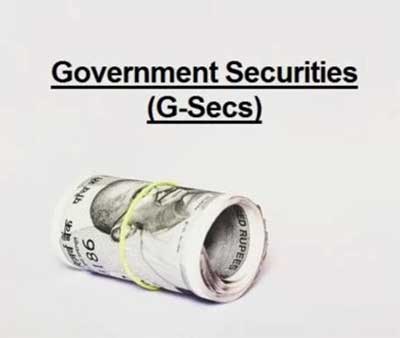Relevance: GS-3: Indian Economy, Government Policies & Interventions, Capital Market.
Key phrases: Government Securities, T-bills, Cash management bills, RBI, Tradable, Retail investor
Why in News?
- For long, Indian retail investors seeking regular income haven’t had access to the safest and most reliable option in the market — the government securities.
What is Government Security?
- A Government Security (G-Sec) is a tradeable instrument issued by the Central Government or the State Governments. It acknowledges the Government’s debt obligation.
- Such securities are short term (usually called treasury bills, with original maturities of less than one year) or long term (usually called Government bonds or dated securities with original maturity of one year or more).
- In India, the Central Government issues both, treasury bills and bonds or dated securities while the State Governments issue only bonds or dated securities, which are called the State Development Loans (SDLs).
- G-Secs carry practically no risk of default and, hence, are called risk-free gilt-edged instruments.
Types of Government Security
- Treasury Bills (T-bills): T-bills are money market instruments and short term debt instruments issued by the Government of India and are presently issued in three tenors, namely, 91 day, 182 day and 364 day. Treasury bills are zero coupon securities and pay no interest. Instead, they are issued at a discount and redeemed at the face value at maturity. For example, a 91 day Treasury bill of ₹100/- (face value) may be issued at say ₹ 98.20, that is, at a discount of say, ₹1.80 and would be redeemed at the face value of ₹100/-.
- Cash Management Bills (CMBs): In 2010, Government of India, in consultation with RBI introduced a new short-term instrument, known as Cash Management Bills (CMBs), to meet the temporary mismatches in the cash flow of the Government of India. The CMBs have the generic character of T-bills but are issued for maturities less than 91 days.
- Dated G-Secs: Dated G-Secs are securities which carry a fixed or floating coupon (interest rate) which is paid on the face value, on half-yearly basis. Generally, the tenor of dated securities ranges from 5 years to 40 years.
Why the government has allowed retail investor to invest government Securities?
- The RBI is the debt manager for the government. In the forthcoming financial year, the government plans to borrow Rs 12 lakh crore from the market. When the government demands so much money, the price of money (i.e., the interest rate) will move up.
- It is in the governments and RBI’s interest to bring this down. That can happen by broadening the base of investors and making it easier for them to buy G-Secs.
- Allowing direct retail participation in the G-Sec market will promote financialisaton of a vast pool of domestic savings and could be a game-changer in India’s investment market.
- It will make the process of G-sec trading smoother for small investors therefore it will raise retail participation in G-secs and will improve ease of access.
Retail Direct Scheme
- This is a scheme retail investor can use to invest directly in government securities (G-sec) or bonds. To invest, a retail investor needs to open gilt security account known as the “Retail Direct Gilt Account” (RDG) with the Reserve Bank of India (RBI)
- Retail investors can finally invest in directly government securities issued by the Reserve Bank of India (RBI) through so called, RBI’s retail direct platform.
Advantages for retail investors in Government Securities:
- G-sec are risk free: G-sec in the domestic market context are risk free and carry no credit risk.
- G-sec offer decent yields for longer duration. G-sec yield curve extends up to 40 years. With Government issuing securities at different points on the yield curve, G-sec offer an attractive option for savers who need low risk investment options for longer durations.
- G-sec offer prospect of capital gains: As there is an inverse relationship between bond price and interest rate, there is a prospect of capital gains when the interest rates moderate. One, however, must be conscious of market risks that could result in losses in case the interest rate cycle reverses.
- G-sec have reasonable liquidity: G-sec have reasonable liquidity and can be transacted on NDS-OM. With the introduction of Retail Direct Portal, retail investors can now participate easily in primary and secondary market.
- G-sec help to diversify portfolio: Investments in government securities would help in portfolio diversification and consequently reduce risk for retail investors.
- Zero charges under Retail Direct Scheme: Retail Direct Account is completely free of charge and does not involve any intermediary. It would reduce overall transaction charges for individual investors in terms of the charges which they are otherwise required to pay for investing through aggregators or taking indirect exposure through mutual funds.
Source: The Hindu
Mains Question:
Q. Recently, the Reserve Bank of India has proposed to allow retail investors to open gilt accounts with the central bank to invest in Government securities (G-secs) directly, in the light the statement what is government Securities? What is the Significance of retail investors in Government Securities?









